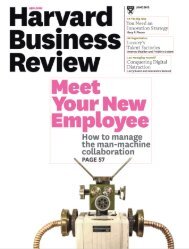+ + +
Create successful ePaper yourself
Turn your PDF publications into a flip-book with our unique Google optimized e-Paper software.
their Godfather theme-song ringtone<br />
go off—but still, you’re delivering a<br />
mini-speech.<br />
So the two most important tips for<br />
public speaking apply. First, keep it<br />
simple. Have one main idea that you can<br />
distill into a single sentence; hit it again<br />
and again. And second, keep it short.<br />
Think of your message as a very intimate<br />
TED talk—and keep in mind that TED<br />
talks are capped at 18 minutes, which<br />
is, according to curator Chris Anderson,<br />
“long enough to be serious and short<br />
enough to hold people’s attention.”<br />
And then deliver your message.<br />
You could just, you know, talk. But<br />
if you want people to actually listen to<br />
you instead of simply staring at you, try:<br />
The classic approach: Say what you’re going<br />
to say. Say it. Then say what you said.<br />
Or … The old-school approach, from<br />
Roman statesman Cicero, 106-43 B.C.:<br />
Introduce the main idea. Provide background.<br />
Outline key points. Make the<br />
full argument, point by point. Refute<br />
opposing arguments.<br />
Or … Dale Carnegie’s Magic Formula:<br />
Relive a personal experience relevant<br />
to the point. Call on attendees to take a<br />
single, specific action. Clearly emphasize<br />
how the listener will benefit from taking<br />
the recommended action.<br />
Or … The Churchillian Flash and<br />
Crescendo: Start off strong and surprising.<br />
Stick to one dominant theme.<br />
Use simple, conversational language.<br />
End dramatically.<br />
Or … The TED talk: Have a strong opening<br />
hook. Order your points. Craft a great<br />
closing story with a call to action.<br />
Each of these approaches allows for<br />
emotion, either implicitly or explicitly.<br />
And though the energy of emotion is<br />
IDEALCONDITIONSFORMEETINGS<br />
If you have any control over where you’ll<br />
be delivering your important message,<br />
consider the following rules:<br />
Early in the day is better than late.<br />
Smaller rooms are better than bigger<br />
rooms. (Unless the smaller room is<br />
just a random space in the office that<br />
someone decided to call a “team area.”)<br />
Fewer people are better than<br />
more people.<br />
A room temperature of 72 degrees<br />
is better than 65 degrees.<br />
Natural light is better than artificial light.<br />
Silence is better than tapping your pen<br />
on the table.<br />
helpful, clarity is the most critical thing.<br />
In meetings, formulaic is a virtue.<br />
BEWARE THE MEETING GRENADE<br />
Despite the clarity of your message<br />
and emotion of your delivery, not everyone<br />
might respond with rapt attention<br />
and furious note-taking. Barry might<br />
audibly yawn, as he does. Sarah might<br />
do the thing where she brings an<br />
apple to the meeting and, when you’re<br />
about to make your most important<br />
point, takes a bite. Jennifer might throw<br />
in a meeting grenade.<br />
What’s a meeting grenade? A comment<br />
or question that destroys the flow of the<br />
meeting. Like this:<br />
YOU: … But the most important<br />
point is, we have to staunch the bleeding.<br />
And here’s how—<br />
JENNIFER: What if we, like, monetized<br />
our Tumblr?<br />
That’s a meeting grenade. It’s related<br />
to the topic but inappropriately delivered,<br />
potentially killing the momentum<br />
and undermining the authority of the<br />
speaker. The way to deal with this, and<br />
anything else that has the power to distract<br />
from the point you are making, is to<br />
pretend that it never happened, to ignore<br />
its existence.<br />
YOU: … But the most important point<br />
is, we have to staunch the bleeding. And<br />
here’s how—<br />
JENNIFER: What if we, like, monetized<br />
our Tumblr?<br />
YOU [glance at Jennifer, then Barry,<br />
then Sarah]: We’re going to monetize<br />
our Instagram.<br />
Is it rude to ignore Jennifer’s point?<br />
Yes. Which makes it appropriate. When<br />
you are delivering an important message<br />
in a meeting, the meeting is your meeting.<br />
Anything that undermines the clarity<br />
of your point is an offense that must be<br />
met with defense. And the defense is to<br />
remain focused, despite any feelings you<br />
might hurt or opportunities to monetize<br />
Tumblr you might eschew.<br />
So make your point. Then, if there’s<br />
time, ask Jennifer what her Tumblr<br />
plans involve, Barry if he got enough<br />
sleep last night and Sarah if that was<br />
a Fuji … or maybe a Paula Red. You’ll<br />
soften your marked earnestness. But<br />
more important, you’ll designate all those<br />
distractions as secondary concerns,<br />
reinforcing the primacy of the stated<br />
point of the meeting and the only thing<br />
that matters while you are talking: what<br />
you want to say.<br />
ROSS MCCAMMON IS A SENIOR EDITOR AT<br />
ESQUIRE. TO LEARN MORE AND TO SUBSCRIBE,<br />
GO TO ESQUIRE.COM. @ROSSMCCAMMON<br />
KEYTECHNICALMATTERS<br />
Make sure you’re talking to<br />
everyone in the room.<br />
Do not be thrown off by the<br />
attendee checking his device.<br />
the attendee will be as rapt as<br />
everyone else.<br />
Make sure people know what<br />
your point is.<br />
Even the attendee checking<br />
his device.<br />
Especially the attendee checking<br />
his device.<br />
If he won’t stop checking his<br />
device, mention his name<br />
during your presentation.<br />
As in: And Daaaaaave here<br />
is gonna be instrumental.<br />
Right, Dave? All of a sudden,<br />
Choose clarity over energy,<br />
structure over emotion, formula<br />
over “So, what else?”<br />
There must be a clear, simple<br />
point to your message.<br />
Make sure people know how long<br />
you’re going to be.<br />
Make sure how long you’re going<br />
to be is: short.<br />
MARCH 2015 ENTREPRENEUR 29






